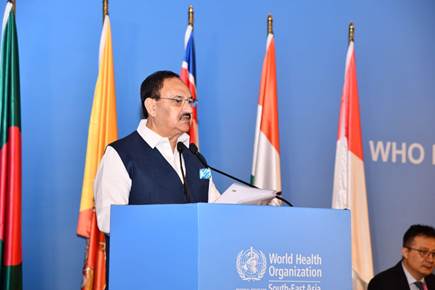The opening session of the Regional Committee meeting included election of office bearers
India’s health system embraces a “whole of government” and “whole of society” approach to achieve Universal Health Coverage, with emphasis on strengthening primary healthcare and essential services health minister J P Nadda told the 7th session of WHO Southeast Asia Region (SEARO) Monday.
The opening session of the Regional Committee meeting included election of office bearers, establishment of a “Drafting Group for Resolutions and Decisions”, adoption of “Special Procedures” to regulate the conduct of the session and adoption of the provisional Agenda.
Nadda said that “In line with the commitment to provide health cover for all, the Union Government launched the world’s largest publicly funded health assurance scheme, the Ayushman Bharat Pradhan Mantri – Jan Arogya Yojana (AB PM-JAY). This initiative covers over 120 million families, providing an annual hospitalization benefit of USD 6,000 per family.” He highlighted that the government has recently expanded the scheme to all citizens aged 70 years and above. “This expansion will benefit around 45 million families, including 60 million elderly population, by providing them free health insurance coverage. It underscores the government’s commitment to ensuring universal and inclusive healthcare for India’s growing elderly demographic.”
Recognizing the growing public health challenges posed by non-communicable diseases (NCDs), the Union Health Minister stated that “India is implementing the National Programme for Prevention and Control of NCDs since 2010 to address conditions such as hypertension, diabetes and cardiovascular diseases. This initiative has led to establishment of 753 NCD clinics, 356 Day Care Centers, and 6,238 Community Health Centers to focus on preventive measures at an early stage.”
Dignitaries present at the event included Dr Razia Pendse, Chef de Cabinet, WHO Headquarters; Mr. Lyonpo Tandin Wangchuk, Minister of Health, Bhutan; Mr Abdulla Nazim Ibrahim, Minister of Health, Maldives; Mr. Pradip Paudel, Minister of Health and Population, Nepal; Dr Elia Antonio de Araujo Dos Reis Amaral, Minister of Health, Timor Leste; Mr MA Akmall Hossain Azad, Senior Secretary, Ministry of Health and Family Welfare, Bangladesh; Mr. Kunta Wibawa Dasa Nugraha, General Secretary, Ministry of Health, Indonesia; Dr PG Mahipala, Secretary, Ministry of Health, Sri Lanka; Mr. Choe Hui Chol, Ambassador of the Democratic People’s Republic of Korea to the Republic of India and Dr Weerawut Imsamran, Deputy Permanent Secretary, Ministry of Public Health, Thailand.
Addressing the session, Saima Wazed, Regional Director, WHO SEARO said, “In 1948, when the first Regional Committee for South-East Asia was formed, the infant mortality rate globally was around 147. Today it is 25. Then, the antibiotic age had just begun. Today, we are faced with antimicrobial resistance”.


